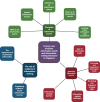Identifying primary care clinicians' preferences for, barriers to, and facilitators of information-seeking in clinical practice in Singapore: a qualitative study
- PMID: 38762445
- PMCID: PMC11102200
- DOI: 10.1186/s12875-024-02429-x
Identifying primary care clinicians' preferences for, barriers to, and facilitators of information-seeking in clinical practice in Singapore: a qualitative study
Abstract
Background: The growth of medical knowledge and patient care complexity calls for improved clinician access to evidence-based resources. This study aimed to explore the primary care clinicians' preferences for, barriers to, and facilitators of information-seeking in clinical practice in Singapore.
Methods: A convenience sample of ten doctors and ten nurses was recruited. We conducted semi-structured face-to-face in-depth interviews. The interviews were recorded, transcribed verbatim, and analysed using thematic content analysis.
Results: Of the 20 participants, eight doctors and ten nurses worked at government-funded polyclinics and two doctors worked in private practice. Most clinicians sought clinical information daily at the point-of-care. The most searched-for information by clinicians in practice was less common conditions. Clinicians preferred evidence-based resources such as clinical practice guidelines and UpToDate®. Clinical practice guidelines were mostly used when they were updated or based on memory. Clinicians also commonly sought answers from their peers. Furthermore, clinicians frequently use smartphones to access the Google search engine and UpToDate® app. The barriers to accessing clinical information included the lack of time, internet surfing separation of work computers, limited search functions in the organisation's server, and limited access to medical literature databases. The facilitators of accessing clinical information included convenience, easy access, and trustworthiness of information sources.
Conclusion: Most primary care clinicians in our study sought clinical information at the point-of-care daily and reported increasing use of smartphones for information-seeking. Future research focusing on interventions to improve access to credible clinical information for primary care clinicians at the point-of-care is recommended.
Trial registration: This study has been reviewed by NHG Domain Specific Review Board (NHG DSRB) (the central ethics committee) for ethics approval. NHG DSRB Reference Number: 2018/01355 (31/07/2019).
Keywords: Evidence-based medicine; Information-seeking behaviour; Nurses; Physicians; Smartphone.
© 2024. The Author(s).
Conflict of interest statement
The authors declare no competing interests.
Figures
Similar articles
-
Information-seeking behaviour of primary care clinicians in Singapore at the point-of-care: A qualitative study.Health Info Libr J. 2024 Dec;41(4):418-428. doi: 10.1111/hir.12535. Epub 2024 May 28. Health Info Libr J. 2024. PMID: 38804103 Free PMC article.
-
Clinician Attitudes and Perceptions of Point-of-Care Information Resources and Their Integration Into Electronic Health Records: Qualitative Interview Study.JMIR Med Inform. 2025 May 26;13:e60191. doi: 10.2196/60191. JMIR Med Inform. 2025. PMID: 40418791 Free PMC article.
-
Rural Doctors' Views on and Experiences with Evidence-Based Medicine: The FrEEDoM Qualitative Study.PLoS One. 2016 Mar 31;11(3):e0152649. doi: 10.1371/journal.pone.0152649. eCollection 2016. PLoS One. 2016. PMID: 27031700 Free PMC article.
-
Clinical information seeking behavior of physicians: A systematic review.Int J Med Inform. 2020 Jul;139:104144. doi: 10.1016/j.ijmedinf.2020.104144. Epub 2020 Apr 18. Int J Med Inform. 2020. PMID: 32334400
-
Clinicians' attitudes and perceived barriers and facilitators to cancer treatment clinical practice guideline adherence: a systematic review of qualitative and quantitative literature.Implement Sci. 2020 May 27;15(1):39. doi: 10.1186/s13012-020-00991-3. Implement Sci. 2020. PMID: 32460797 Free PMC article.
References
-
- Ministry of Health. Primary healthcare services Singapore 2022 [updated 31/05/2022]. Available from: https://www.moh.gov.sg/home/our-healthcare-system/healthcare-services-an....
-
- College of family physicians singapore. Fellowship Programme (FCFPS) Singapore2022 [updated 2022]. Available from: https://www.cfps.org.sg/programmes/fellowship-programme-fcfps/.
MeSH terms
Grants and funding
- IRB-2019-08-021/Seedcorn Grant Centre for Primary Health Care Research and Innovation, a joint Lee Kong Chian School of Medicine, and the National Healthcare Group Polyclinics Initiative.
- IRB-2019-08-021/Seedcorn Grant Centre for Primary Health Care Research and Innovation, a joint Lee Kong Chian School of Medicine, and the National Healthcare Group Polyclinics Initiative.
- IRB-2019-08-021/Seedcorn Grant Centre for Primary Health Care Research and Innovation, a joint Lee Kong Chian School of Medicine, and the National Healthcare Group Polyclinics Initiative.
- IRB-2019-08-021/Seedcorn Grant Centre for Primary Health Care Research and Innovation, a joint Lee Kong Chian School of Medicine, and the National Healthcare Group Polyclinics Initiative.
LinkOut - more resources
Full Text Sources

